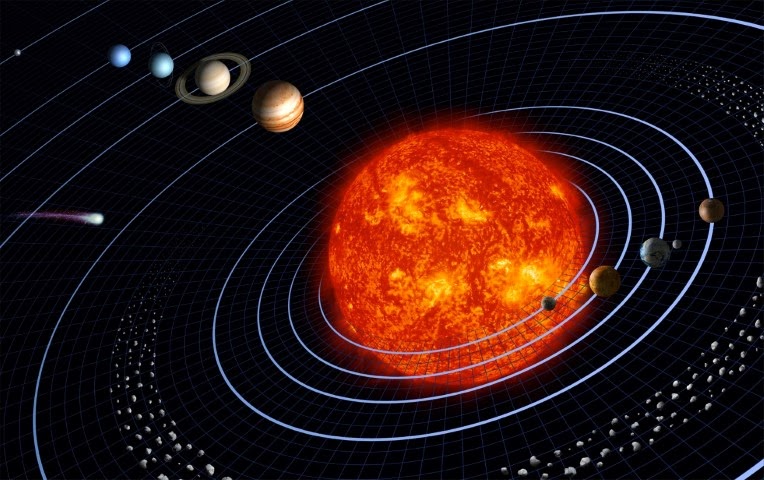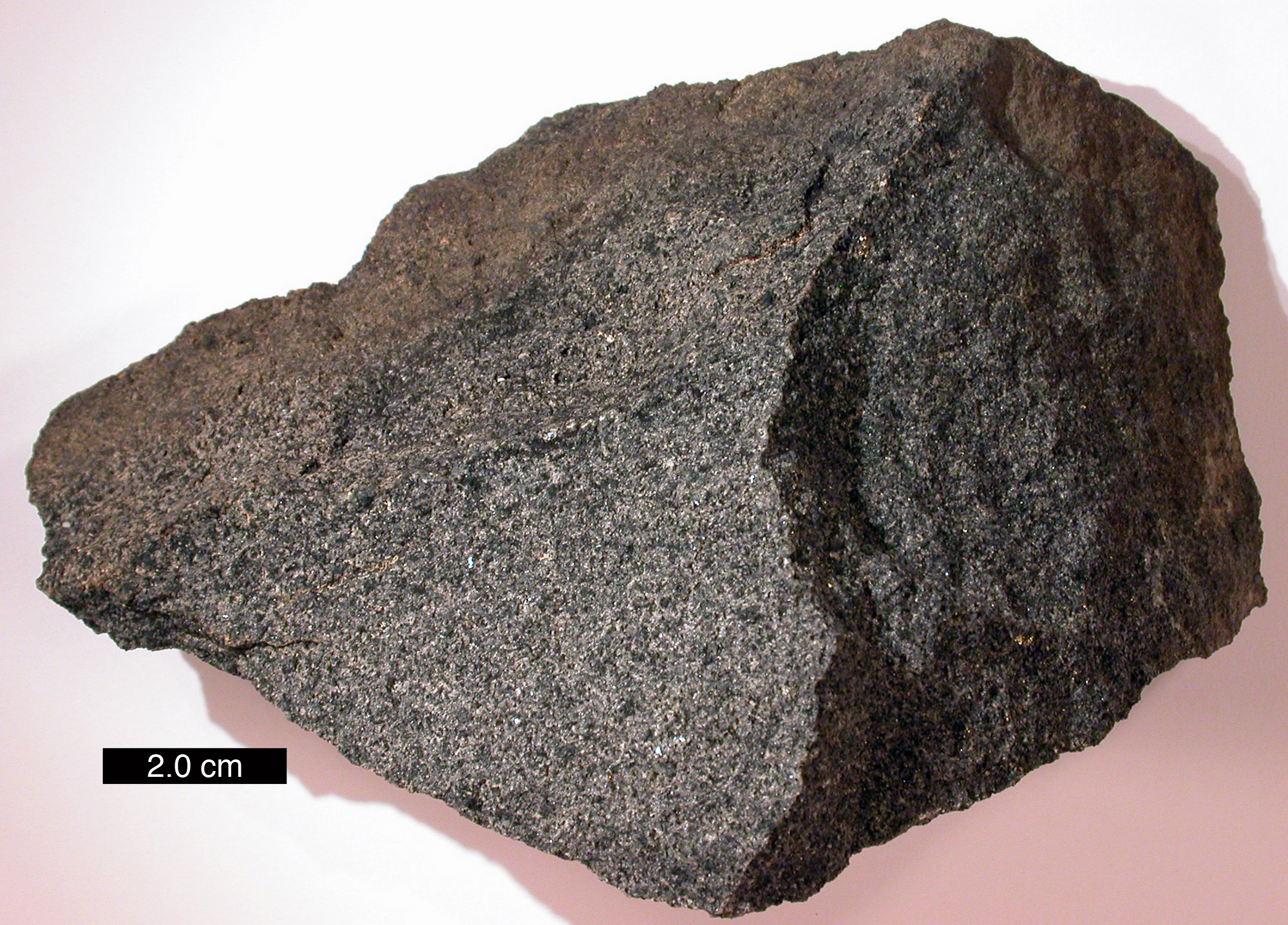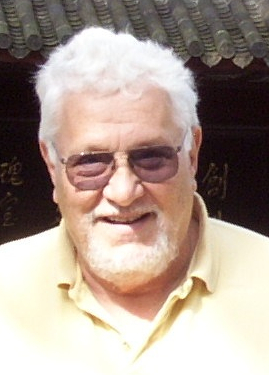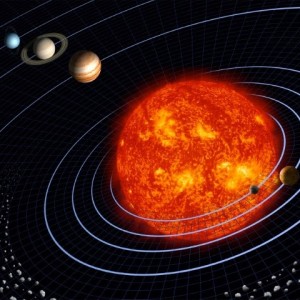The central problem with atheistic materialism is nothing, really.
Metaphysical nothing, to be exact.
 |
| The Solar System (not to scale) |
Any worldview, including atheism, should be able to give some sort of coherent answer to the rudimentary question of why the universe exists. I don’t mean “why does this universe exist rather than another?” I mean, “why does there exist anything, rather than nothing?”
Dr. Victor Stenger, in a Huffington Post piece on how to debate religion, claims to have an answer. It turns out to be the standard materialist response given by many atheist scientists. It’s not pretty:
How can something come from nothing?
“Nothing” is notoriously difficult to define. To define it you have to give it some property. But then if it has a property it is not “nothing.” So this is an incoherent question unless you define nothing as an empty vacuum.
 |
| Comedian Ernie Hare, holding a glass with “nothing” in it (1920). |
Although the average value of a field in a particular region may indeed be zero, quantum theory predicts that there will be fluctuations around this zero value. Each fluctuation signiies the brief appearance of a ‘virtual’ particle. Hence, even in a true vacuum, matter fields may appear briefly. Even if the matter fields involved in the vacuum state are rather peculiar and certainly not observable in the sense that ‘real’ particles are, it is a mistake to think of any physical vacuum as some absolutely empty ‘void.’
This is similar to the analogy that the physicist Stephen Barr uses to explain the difference between a vacuum state and metaphysical nothing:
An analogy may help here. A checking account is a system that has many possible states: the zero-dollar state, the thousand-dollar state, the negative-thousand-dollar state (if one is overdrawn), the million-dollar state, etc. And this system can make transitions from one state to another. For instance, by a finance charge or by accruing interest. Even if your checking account happens to be in the zero-dollar state one day, the checking account is nevertheless still something definite and real, not “nothing.” It presupposes a bank, a monetary system, a contract between you and that bank”all being governed by various systems of rules.Imagine the day on which your bank account balance is zero. Then imagine a deposit the next day that raises it to one thousand dollars. A quantum theory of the creation of a universe (in Hawking’s version, or Vilenkin’s, or anyone else’s) is akin to this transition from an empty account to one full of money. Obviously, therefore, the “nothing” that Hawking makes part of his theory of the creation of our universe is not nothing in a metaphysical sense. The “no-universe” of his speculations is like the “no-dollars” in my account. It exists within the framework of a complex overarching system with specific rules. So we can see that, if true, the way of thinking put forward by Hawking does not threaten the classical doctrine of creation out of nothing.
This is the most glaring problem with Stenger’s answer (and the answer given by all of the atheist materialists). But there are other problems, too:
 |
| What does this rock eat? |
There is a related, but more fundamental problem with Stenger’s answer: it isn’t responsive to the question asked. If I asked you what a rock eats, you would rightly answer “nothing.” And you wouldn’t mean that rocks eat vacuum states. You would mean that they eat nothing, that they don’t eat. If I asked what you know about quantum mechanics, and you said “nothing,” you wouldn’t mean that you know all about vacuum states. For that matter, when Stenger says “Nothing like this has ever happened,” he isn’t talking about empty vacuums.
In all of these cases, we see that we can meaningfully speak about “nothing” without referring to vacuums. So when Stenger claims that it “is an incoherent question unless you define nothing as an empty vacuum,” the most charitable thing that can be said is that he has no idea what he’s talking about.
Stenger is simply changing the question. He’s asked how the materialist can get from utter, metaphysical, non-existence to a universe. He doesn’t answer this. Instead, he changes it to an argument about whether or not matter can appear within a quantum state (inside of an already-existing, empty universe). But these aren’t even remotely the same question.
It’s clear why he wants to shift the debate: Stenger, a physicist, seems to know very little about philosophy (or history, but that’s a matter for another day), so he’s simply redefined the question to make it about physics. But the actual question isn’t a question about physics, but about something more basic: metaphysics. A related question would be: how and why is there a universe that physics can study? Obviously, that’s not a question that physics can answer, since physics necessarily assumes the prior existence of this universe in order to operate.
Stenger is a materialist, and he’s giving a classic materialist (non-)answer to the problem of “nothing.” But to see the absurdity of this question, I wish someone would ask him: “what exists besides the material world?” Just imagine the dialogue:
What exists beside the material world?
Nothing.
Oh, a vacuum?
Since a vacuum is part of the material universe, this answer would be equivalent to saying, “outside of my house is the rest of the inside of my house.” In other words: utter incoherent. It would also be a refutation of materialism, to the extent that he would have to affirm that in addition to the material world, there are also vacuums that somehow exist immaterially.
And of course, if he have any other answer – if he said that there exists something other than the material world – then he would also be rejecting materialism. So you can see why understanding “nothing” as “an empty vacuum” is nonsensical, right?
Stenger isn’t the only physicist with a problem with “nothing.” Neil deGrasse Tyson hosted a debate on nothing last year, and none of the participants were able to come up with a suitable definition. The philosopher Jim Holt pointed out that if you “nothing” with “lacking matter,” this would mean that mathematics, physical laws, and consciousness are nothing.
 |
| Dr. Victor Stenger |
What we call the “laws” of physics are not something inherent in the universe. They are not commandments that material objects must obey. They are principles that physicists build into models to describe their observations. We should not assume that any of the ingredients in the models of physics correspond one-to-one with actual objects of ultimate reality. Of course, they must have something to do with reality to agree with observations. But we have no way of knowing exactly what that something is, so we waste our time arguing about it.
Our willingness to accept scientific claims that are against common sense is the key to an understanding of the real struggle between science and the supernatural. We take the side of science in spite of the patent absurdity of some of its constructs, in spite of its failure to fulfill many of its extravagant promises of health and life, in spite of the tolerance of the scientific community for unsubstantiated just-so stories, because we have a prior commitment, a commitment to materialism. It is not that the methods and institutions of science somehow compel us to accept a material explanation of the phenomenal world, but, on the contrary, that we are forced by our a priori adherence to material causes to create an apparatus of investigation and a set of concepts that produce material explanations, no matter how counter-intuitive, no matter how mystifying to the uninitiated. Moreover, that materialism is absolute, for we cannot allow a Divine Foot in the door.
If you believe in God, then you can give a coherent account of why there exists something, rather than nothing, and you can explain why the something that does exist is ordered and coherent. That gives you the foundation upon which to do real science (which is why, as a matter of historical fact, modern science was born in Catholic universities and monasteries, and why most of the finest institutions around the world were founded by religious groups). If you reject this foundation, you risk ending up in Stenger’s incoherence, undermining the truth of mathematics, denying the truth of the laws of physics, and incapable of answering why the universe exists.

Is it true to say that metaphysical ‘nothing’ does not exist? And therefore metaphysical ‘nothingness’ is impossible to define? To my ignorant brain, and my belief in God, these statements seem true… unless I’m missing a metaphysical something??
Well, since it in its essence is non-existence, by definition it can not exist. You can not have existing non-existence. Nevertheless one can metaphorically speak of its existing, as what existed before God created the Heavens and the Earth.
Perhaps it helps to compare to lesser forms of non-existence.
There is no such thing as cold, there is only the absence of heat.
There is no such thing as darkness, there is only the absence of light.
This comment has been removed by the author.
To Awlms:
Try this: The absence of being, or…the absence of existence.
You can also break down the word ‘nothing’ into … no thing.
This comment has been removed by the author.
Basically it’s like asking if numbers exist with nothing to count and no one to count them.
Not quite, Daniel. Numbers simply represent quantity applicable to real being. If a person asks your question, numbers apply to that person. The Number “One” applies to the Divine Being.
I have often reflected on why as a young man I was drawn to the atheistic materialism ( I didn’t call it that at the time). I was big into science study in college which was formative but in my reflection I think that I wanted to be smart. Just smart., I wanted to be seen, thought of, and comforted in smartness and the going trend was bag the God thing. Not seeing God in tv, movies, books, songs, etc reinforced it probably and not being close to Our Lord was the other root cause. But my love affair with science was short lived. Being careful of what one reads and all. Thanks Joe for your writing.